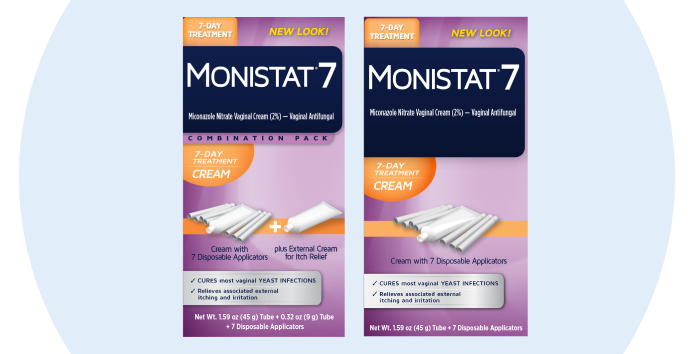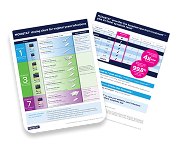
Pregnancy
MONISTAT® 7 meets CDC Guidelines for treating VVC during pregnancy2
Even a single, low dose of fluconazole may increase miscarriage risk.7
Two recent studies suggest that fluconazole may significantly increase miscarriage risk:
Fluconazole Risks in Pregnancy
CMAJ 2019 (Canadian Medical Association Journal)22
Less than or equal to 150 mg of fluconazole was associated with
2x higher risk of miscarriage
< 150 mg of fluconazole was associated with
3x higher risk of miscarriage
150 mg of fluconazole in 1st trimester was associated with 80% higher risk of certain neonatal anomalies
A 2019 study found that pregnant women taking ≤150 mg of fluconazole had a 2x higher risk of miscarriage, and women taking >150 mg had a 3x higher risk. Taking >150 mg during the first trimester was also linked to an 80% higher risk of neonatal cardiac septal closure anomalies.22
A 2016 study in JAMA found that women taking 1 or 2 fluconazole 150 mg pills during 7 through 22 weeks gestation had a significantly higher risk of miscarriage.7
The 2016 study informed an FDA Drug Safety Communication8:
- Pregnant women and women trying to get pregnant should discuss alternative treatment options to fluconazole with their healthcare professionals8
The FDA is reviewing the study results and other data before making a final recommendation.
Awareness of fluconazole miscarriage risks may be limited. In a 2017 survey, 57% of OB/GYNs said they prescribe fluconazole during some or all trimesters of pregnancy.14

For patients who are pregnant or plan to become pregnant, recommend MONISTAT® 7 for vaginal yeast infection.2,8
MONISTAT® 7 meets CDC Guidelines for treating vulvovaginal candidiasis (VVC) in pregnant women.2 Fluconazole does not.
- Only topical azole therapies, applied for 7 days, are recommended by the CDC for use among pregnant women2
VVC MORE COMMON IN PREGNANCY
- Elevated hormone levels affect the ability of immune cells in the vagina to combat Candida17
- Recurrent infections are likelier17


